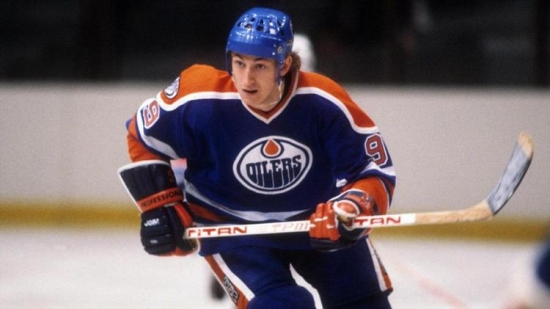Anybody who saw him play as a teenager knew that this was a special player who was always a step ahead of his competition and had better offensive ice vision than anyone else who ever played. As the NHL had a rule prohibiting the signing of under-20 players, Gretzky signed with the Indianapolis Racers of the World Hockey Association. Still, after eight games, they were hemorrhaging money, and he would be traded to the Edmonton Oilers for Cash. In what would be the final season of the WHA, Gretzky was named the Lou Kaplan Trophy winner (WHA's version of the Rookie of the Year) and was third in scoring.
The Oilers were able to keep two skaters when they merged with the National Hockey League, and of course, Gretzky was one of them. Those who thought that Gretzky might falter in the more elite NHL were wrong; they could not have been more erroneous.
Gretzky scored 137 Points and won the Hart Trophy (for the first of eight straight times) as the league's MVP, and it was "up, up, and away" from there. In 1980-81, he would set a new record for Points with 164 and won his first of what would be seven straight Art Ross Trophies. This would start the trend of Gretzky setting records, only to break them himself, while making the city of Edmonton the go-to destination for hockey fans.
Already a two-time 50-Goal scorer, Gretzky put the puck in the net 92 times in 1981-82 after shattering the 50 Goals in 50 Games mark by doing it in 39 Games. “The Great One” also had 120 Assists totaling 212 Points, making him the first to accumulate over 200 Points in a season. He followed that up with a 196 Point campaign, but Gretzky had more to accomplish for the Edmonton Oilers.
Gretzky led the Oilers to a Stanley Cup Final in 1983, where they lost to the New York Islanders, who had won four consecutive championships. The Oilers were loaded with talent, featuring players like Gretzky, Mark Messier, Jari Kurri, Paul Coffey, Glenn Anderson, and Grant Fuhr, and the Oilers won their first Stanley Cup in 1984. That season, Gretzky had his second 200 Point Season (205) with 87 Goals. The Oilers won it again in 1985, with Gretzky winning the Conn Smythe and having another 200 Point Season (208).
1985-86 was bittersweet for Gretzky. He would set single-season records of 163 Assists and 215 Points, but the Calgary Flames bounced the Oilers in the Playoffs, and the melancholy was short-lived. Gretzky again led the Oilers to Stanley Cup wins in 1987 and 1988, the latter of which saw him win his second Conn Smythe Trophy.
The legend of Gretzky in Edmonton after his fourth Stanley Cup was when he was traded to the Los Angeles Kings. He had requested a trade after learning that Peter Pocklington, the Oilers Owner, had been shopping him as his other business ventures were not doing well. Gretzky was traded to the Los Angeles Kings on August 9, 1988, a move that every Canadian remembers where they were when they heard it.
Gretzky goes down as the most exceptional playmaker that the game of hockey has ever seen, and his overall numbers with Edmonton show the following:
8 Hart Trophies, 7 Art Ross Trophies, 4 Stanley Cups, 2.30 PPG, 1,773 Points.
Gretzky may have left Edmonton as a player in 1988, but he will always own the city.When he retired in 1999, he was inducted into the Hockey Hall of Fame immediately. Edmonton retired his number 99, and later on, the entire league followed suit. He would also be part of the inaugural Edmonton Oilers Hall of Fame in 2022. There can only be one "Great One".








Comments powered by CComment